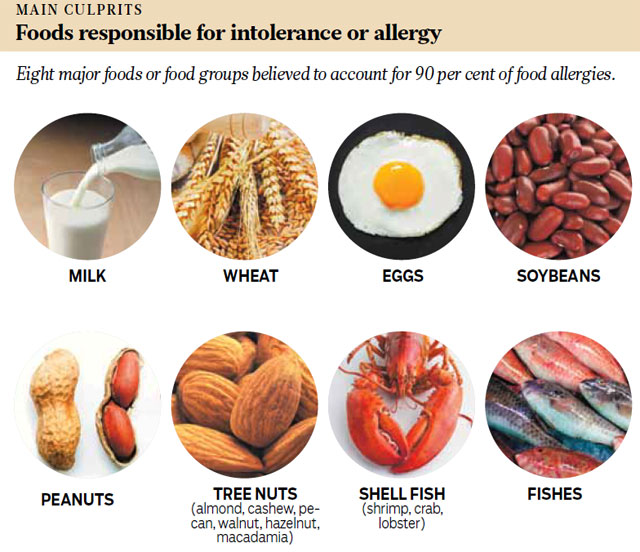Table of Contents
Food Allergy or Sensitivity?
Causes and Associated Factors * Lab Testing * Optional Therapies
What Can You Do? * Work with a Nutritionist
What’s the Difference?
Food Allergy is the most common word that we are familiar with. However, many people have food sensitivities. Food sensitivity may even escalate to an allergy because it is simply not recognized. Did you know that when you have a headache, a skin rash, or a stomach ache, it may be an initial sensitivity to various foods?
Food Allergy or Sensitivity?

Figuring out the difference can be complex. Food is the foundation of nutrition. Food quality and quantity will determine how healthy or how sensitive a person will be.
An adverse reaction to food appears to be either toxic (e.g. food poisoning) or non-toxic. A nontoxic adverse reaction is typically either a food allergy or food sensitivity.
Food Allergy
The symptoms of a “true” food allergy show up immediately after eating. The symptoms are often very dramatic. For example swelling, hives, welts, or asthma attacks may occur. These foods must be avoided completely because this type of food allergy can be life-threatening (swelling in the throat can interfere with breathing). Common foods with this type of reaction are peanuts or shellfish. Food allergies are typically fatigue, joint pain, congestion, headache, rashes, and chronic intestinal symptoms. In extreme cases, food allergies can lead to anaphylactic shock and death if untreated. A food allergy is mediated by IgE antibodies (specific adaptive immunity). This reaction is considered a “classic allergy”.
Food Sensitivity
Food sensitivity symptoms also range from similar allergy symptoms. They include hyperactivity, bloating, mood changes, or dark circles under the eyes. Food sensitivity may be referred to as an inability to metabolize, digest, or absorb a specific food. Food sensitivity is currently defined as an adverse reaction to a food that is not due to an IgE-mediated reaction or a metabolic deficiency. It does, however, appear to involve an immune-inflammatory reaction that may be local or systemic.
Food Sensitivity Symptoms may Mimic a Food Allergy
Also, keep in mind that some food sensitivity symptoms may mimic a food allergy. This is why it is important to rule out IgE-mediated food allergies when testing for sensitivities. IgG symptoms typically occur within 3-72 hours after the offending food was ingested and they will create ongoing inflammation that can make most conditions worse. The degree and severity of symptoms vary greatly from person to person.
IgE
IgE (immunoglobulin E) allergies are the immediate responses to a foreign substance that has entered the body via food or inhalation. IgE allergies can cause very serious symptoms like difficulty in breathing, swelling, and hives. In more serious cases, IgE reactions can lead to anaphylactic shock.
IgG
IgG (immunoglobulin G, total) symptoms typically show up in delayed reactions (3-72 hours) after the offending food was ingested. IgG symptoms can create ongoing inflammation that can make most conditions worse. IgG antibodies provide long-term resistance to infections and have a much longer half-life than an IgE allergy. This food sensitivity can be more subtle and many people live with it for years, if not their entire lives.
Statistics
In the US, approximately 50 million people suffer from allergies. The prevalence of food allergies has been increasing and it is estimated that 50% of adults and 70% of children suffer from food allergies. In extreme cases, food allergies can lead to anaphylactic shock and death if untreated. The symptoms of food allergies are typically fatigue, joint pain, congestion, headache, rashes, and chronic intestinal symptoms.
Common Symptoms May Include:
- Dermatological: Eczema, psoriasis, rashes, itching, acne.
- Gastrointestinal: Gas, bloating, rectal bleeding, constipation, diarrhea.
- General: Fatigue, mouth ulcers, headache, low energy, nutritional deficiencies.
- Hormonal: PMS symptoms, thyroid imbalance, insulin resistance.
- Immunological: Decreased ability to fight infections, delayed recovery time.
- Learning Challenges: ADD/ADHD, behavioral problems, memory loss.
- Musculoskeletal: Muscle and joint pain, inflammation, trigger point tenderness.
- Neurological: Brain fog, mood swings, anxiety, depression, sleep disturbance.
- Respiratory: Chest tightness, phlegm, wheezing, chronic cough.
Conditions Commonly Related to or Aggravated by Food Allergies
ADD/ADHD Anxiety Celiac IBS/IBD Rheumatoid Arthritis Allergies Crohn’s Lupus Scleroderma Asthma Depression Memory Loss Sinusitis Arthritis Eczema Mood Disorders Low immunity Chronic Fatigue Autoimmune Diseases Fibromyalgia Multiple Sclerosis Behavioral Problems Headaches Poor Digestion Bloating Insomnia Psoriasis
Please note:
I am not a doctor. I am a Master Nutrition Therapist. I use food therapy as my favorite therapy to approach most chronic diseases and conditions; including obesity, diabetes, metabolic syndrome, depression, and gut diseases. I also use a variety of supplements and subtle energy tools to assist, along with food.
Everything here is my opinion and is provided for educational purposes.
______________________________________________________
We Believe that Food is Medicine and Medicine is FOOD.
Hippocrates laid down the foundations for modern medicine in Greece in 400 BC: “Let thy food be thy medicine and thy medicine be thy food.” He believed the human body had an innate capacity for self-healing. “First, do no harm…let thy food be thy medicine.” His “Hippocratic Oath” is still recited by health practitioners today. Are you ready to learn more about whole food wellness? Then, you have found the right place! Nothing tastes better than food to provide freedom from pain and live in abundant health. Please contact us with any questions.
Hope, Healing, and Wellness
Debbie believes that healthful eating is within the reach of everyone. We recognize that nutritional and dietary challenges are a challenge with advertising commercials and billboards that tell us otherwise. We work closely with each individual to help develop a healthier, more intuitive, and more sustainable relationship with food. Are you ready to make a difference in your food choices today? If you would like to email Debbie, complete the contact form below, and please note that we can schedule appointments only by phone.
_______________________________
Denver Nutrition, LLC | Transformation Through Nutrition
Contact Debbie | Services | Food Sensitivity Testing | Meet Debbie
